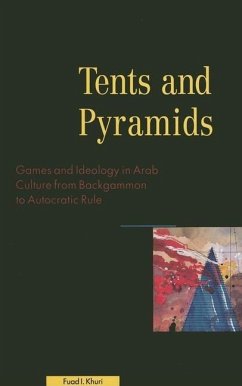Tents and Pyramids deals with an unusual and absorbing topic: how the Arabs see and deal with reality and the implications this has for the nature of power in the Arab world. 'Tents' and 'pyramids' are, metaphorically opposed mental images; the first signifies the absence of hierarchy and graded authority, the second the presence of both. Khuri argues that the Arabs perceive both social and physical reality as a series of discrete, non-pyramidal structures that are inherently equal in value much like a bedouin encampment composed of tents scattered haphazardly on a flat desert surface with no visible hierarchy. Authority is not built into a hierarchical arrangement where the roles are subordinated to one another in a graded system (as in the West); it is, rather, derived from the use of sheer physical power, with one person dominating the others-a first among 'equals'. Strategy, manoeuvrability and tactics take precedence over office and structure. The strategy is to act in groups; the isolated are vulnerable. There are striking parallels between these mental constructs and the behavioural patterns in Arab society, in situations ranging from backgammon to autocratic rule. The book examines the mechanisms involved in sports and card games, poetry and prose, charting genealogies and laws of inheritance, etc. Since there are no 'pyramids', there are no standardised rules of succession to high office. Government belongs to the powerful, the conquerors. And power rests in the control of solidarities, or endogamous groups, which militates against the rise of a 'public' that holds the ruler accountable for his actions. There is no public and therefore no republic. Whether'president', 'king', 'sultan', 'imam' or 'emir', the governor always rules autocratically.
Bitte wählen Sie Ihr Anliegen aus.
Rechnungen
Retourenschein anfordern
Bestellstatus
Storno








